- LIBERTY CAP
- See ‘cap of liberty’.
![[liberty cap example]](../images/v/vxt-d1112.gif)
Flag of Jujuy, Argentina (fotw)
- LIEUTENANT COLONEL’S COLOUR (or COLOR)
- See ‘stand of colours 1)’ and ‘venn’.
![[Lieutenant Colonel’s Colours example]](../images/v/vxt-d2389a.gif)
![[Lieutenant Colonel’s Colours example]](../images/v/vxt-d2389b.gif)
![[Lieutenant Colonel’s Colours example]](../images/v/vxt-d2389c.gif)
![[Lieutenant Colonel’s Colours example]](../images/v/vxt-d2389d.gif)
![[Lieutenant Colonel’s Colours example]](../images/v/vxt-d2389e.gif)
Examples of Lieutenant Colonel’s Colours, English c1641 (Željko Heimer, CS and fotw)
- LIGATURE
- See ‘monogram’.
![[ligature example]](../images/v/vxt-d1239.gif)
Presidential Flag of France (1894 - 1895) (fotw)
- LIGHTFASTNESS
- See ‘fastness’.
- LINED
- 1) See ‘edging 1)’.
- 2) A term sometimes used to describe the detail lines within a charge
or a figure – but see ‘garnished’ and
‘masoned’ (also ‘charge 1)’.
- 3) In heraldry a term for the lining (either fur or fabric) of a mantle or pavilion, or if a
bear or greyhound has a line affixed to its collar (see also ‘mantle’
and ‘pavilion’).
- LINGUISTIC FLAGS
- 1) Flag-like images that are intended to link together communities which speak the same language
irrespective of national boundaries, and which are usually an amalgam of the national flags concerned
- an amalgam or amalgam language flag (see also
‘combined flag’ and
‘patchwork flag 1)’ ).
- 2) Flags that are intended to represent a link through the use of a common natural language,
generally (but not invariably) countries previously held by colonial ties – such as that of the Francophonie.
- 3) Flags that are intended to represent one of the constructed languages, for example Esperanto.
- 4) Flag images, usually (but not invariably) those of national flags, which are used on the Internet
(and on other documentation) to indicate in which languages the material on a particular site are available
for the convenience of the reader.
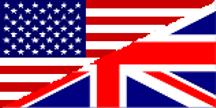
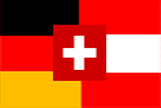

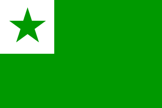
From left: Amalgam Language Flags for English and German (CS) Flag of the Francophonie;
Esperanto flag (fotw)
Please note with regard to 1) that these images do not (as far as is known) exist in cloth.
- LITTEN
- A term sometimes used in heraldic blazoning to describe the windows and/or door of a
castle, tower or other building, particularly when these are shown in a different tincture
(see also ‘tinctures’ and ‘tower-towered’).
![[litten example]](../images/v/vxt-d1265a.gif)
![[litten example]](../images/v/vxt-d1265b.gif)
![[litten example]](../images/v/vxt-d1266a.gif)
![[litten example]](../images/v/vxt-d1266b.gif)
Arms and Flag of Viseu, Portugal (fotw and
ICH); Arms and Flag of
Miranda do Douro, Portugal (fotw and ICH)
Please note that this term, whilst being an archaic alternative to “lighted” or “lit”, is not generally seen in English heraldry.
- LIVERY BANNER
- The term, now obsolete, for a small square flag in the deceased person’s livery colours,
usually for use at that person’s funeral (see also
‘badge banner’,
‘livery colours 1)’,
‘great banner’,
‘grumphion’ and
‘bannerole’).
![[livery banner example]](../images/v/vxt-d1113.gif)
Livery Banner of The Royal House of Tudor 16thC, England
- LIVERY COLOURS (or COLORS)
- The principal colours (often - but not exclusively - the first metal and first
colour) of a coat of arms and generally (but not exclusively) shown as two or three stripes on flags
(see also ‘armorial banner 2)’, ‘banner 2)’,
‘coat of arms 2)’,
‘hanging flag’,
‘rule of tincture’,
‘state colours 3)’,
‘streamer 2)’
and ‘wreath 2)’).
- 2) A term soetimes applied to the principal colours of a flag unrelated to a coat of arms - but see
‘national colours 2)’ and
‘state colours 3)’.
![[Livery colour example]](../images/v/vxt-d197.gif)
![[Livery colour example]](../images/v/vxt-d197a.gif)
![[Livery colour example]](../images/v/vxt-d197b.gif)
![[Livery colour example]](../images/v/vxt-d1687a.gif)
![[Livery colour example]](../images/v/vxt-d1687b.gif)
![[Livery colour example]](../images/v/vxt-d1688a.gif)
![[Livery colour example]](../images/v/vxt-d1688b.gif)
Arms and Flag of Cerklje na Gorenjskem, Slovenia (fotw); The State Arms and
National Flag of Germany (fotw); Arms and Flag of
Bobnice, Czech Republic (fotw); The State Arms and National Flag of
Poland (fotw)
Please note that the term is derived from the colours – usually
taken from a family’s arms - worn as a livery by the servants of that family.
- LODGING
- In UK usage now obsolete, a term for the formal housing and display of a colour at
and/or from premises in a municipality where the relevant battalion was temporarily staying
(see also ‘cased’ and
‘dislodging’).
- LOGO
- 1) A design serving as the symbol of a commercial enterprise or educational
establishment, or other entity, that is not a coat of arms, seal, badge or emblem as
defined herein – see note below (also ‘badge 1) &-3)’,
‘coat of arms’,
‘corporate flag’,
all entries under ‘emblem’,
‘house flag 1)’,
‘institutional flag, official’,
institutional flag, unofficial’ and
seal.
- 2) A simplified version of an existing badge or of an emblem that is often
used in lieu of these for the same purpose.
![[logo flag]](../images/v/vxt-d586.gif)
![[logo flag]](../images/v/vxt-d1797.gif)
![[logo flag]](../images/v/vxt-d1798.gif)
![[logo flag]](../images/v/vxt-d2015.gif)
Flag of the Portuguese Railway Company (fotw); Flag of
Sealink, UK (fotw);
Flag of The Aaland Islands Post office (fotw);
Former Flag of Aino, Japan (Tomislav Šipek)
Please note that this term is often misapplied, and care should be taken to ensure that
the device being described is not a seal, badge or emblem as referenced above.
- LOGO ON A BEDSHEET (or LOB)
- A term that is intended to be derogatory, and to describe any flag (but particularly the sub-national flags of the US) bearing
an emblem, badge, seal, shield or arms upon a plain field – a bed sheet flag
or building site flag – but see ‘seal on a bedsheet’ with the note below,
‘armorial flag’,
‘armorial ensign’ and
‘seal flag’ (also
‘armorial bearing’,
‘badge 1) - 3)’,
‘coat of arms 2)’, all entries under
‘emblem’, ‘logo’,
‘plain 2)’
‘seal’,
and ‘shield 1)’).
![[Nebraska]](../images/v/vxt-d1689.gif)
![[Kansas]](../images/v/vxt-d2505.gif)
![[Kentuchy]](../images/v/vxt-d2506.gif)
![[Michigan]](../images/v/vxt-d1690.gif)
Flag of the State of Nebraska, US (fotw); Flag of
Kansas, US (fotw); Flag of Kentucky, US (fotw); Flag of
Michigan, US (fotw)
Please note that the Editors would suggest a certain degree of caution when using
this term - it was intended to be derogatory and the definition given above could
equally apply to several types of flag (for example the civic/municipal flags of
Japan) to which any such implication would be inappropriate.
- LONE STAR FLAG
- A colloquial term used to describe the flag of the US state of Texas, which was introduced
in 1839.as that of an independent republic (see also ‘state flag 2)’).
![[Texas flag]](../images/v/vxt-d380.gif)
Flag of the State of Texas, US (fotw)
- LONG CROSS
- See ‘Latin cross’ in ‘appendix VIII’.
![[Civil ensign of Jerusalem]](../images/v/vxt-d1868.gif)
Civil Ensign of Jerusalem 1333 – 1921 (fotw)
- LOOP (or LOOP, THE)
- See ‘flag adjutant’ and its following note.

(Wikipedia)
- LOOPS
- A term that may be used for the increasingly (but by no means entirely) obsolete practice of fixing
a flag or gonfalon to its pole, staff and/or crossbar by a series of attached fabric loops (see also
‘gonfalon 1)’,
‘heading’,
‘ties’ with its following note,
‘ring 4)’ and
‘sleeve 2)’).
Gonfalon of Sutivan, Croatia (fotw);
Flag of Duksyn, Ukraine (fotw)
Please note that this is practice is almost certainly based on the earlier use of ties – see
‘ties’.
- LORD HIGH ADMIRAL'S FLAG
- See ‘anchor flag’.
![[Lord High Admiral flag]](../images/v/vxt-d330.gif)
Flag of The Lord High Admiral 1685 - 1688, England (fotw)
- LORRAINE CROSS
- See ‘cross of Lorraine’.
![[Cross of Lorraine]](../images/v/vxt-d1841.gif)
![[Cross of Lorraine]](../images/v/vxt-d1841a.gif)
Flag and Arms of Skaryszew, Poland (fotw)
- LOWER FLY (or LOWER FLY CANTON)
- In vexillology a term for that quarter of a flag which occupies the lower fly -
the fourth canton or quarter, or lower fly canton (see also 'canton 3)' and
'fly').
![[Fourth canton]](../images/v/vxt-d1576d.gif)
- LOWER HOIST (or LOWER HOIST CANTON)
- In vexillology a term for that quarter of a flag which occupies the lower hoist, -
the third canton or quarter, or the lower hoist canton (see also ‘canton 3)’ and
‘hoist 1)’).
![[Third canton]](../images/v/vxt-d1576c.gif)
- LOWERED
- See ‘abased’.
![[lowered]](../images/v/vxt-d1267.gif)
- LOWERING IN SALUTE
- See ‘dipping’.
![[lowered]](../images/v/vxt-d2254.gif)
(trooping-the-colour.co.uk)
- LOZENGE
- 1) In vexillology the term for a diamond-shape – a rhombus (see also ‘lozenge-throughout’).
2) In heraldry a diamond shape, usually shown with its upper and lower angles
slightly acute – but see the note below, ‘square lozenge’
and
‘fusil’
(also ‘lozengy’, ‘lozengy bendy’
and ‘voided lozenge’).
![[Brazil flag]](../images/v/vxt-d912.gif)
![[lozenge]](../images/v/vxt-d1840.gif)
![[lozenge]](../images/v/vxt-d1645.gif)
![[lozenge]](../images/v/vxt-d913.gif)
National Flag of Brazil (fotw); Flag of
Alem Paraíba, Brazil (fotw); Flag of
Ceará, Brazil (fotw); Example
-
Please note with regard to 2), that in English heraldry
a lozenge
is also the escutcheon upon which a spinster or a widow’s coat of arms is placed (see also
‘armorial bearings’,
‘escutcheon’ and
‘coat of arms’).
![[Escutcheon example]](../images/v/vxt-d2420.gif)
Escutcheon of Kate Middleton before her marriage to HRH Prince William
- LOZENGE-THROUGHOUT (or OVERALL)
- A term that may cover any lozenge (or diamond-shape) whose four points touch the edges
of the flag or panel it occupies – a lozenge or diamond-overall or a diamond-throughout
(see also ‘lozenge 1)’.
![[lozenge-throughout]](../images/v/vxt-d1647.gif)
![[lozenge-throughout]](../images/v/vxt-d1648.gif)
![[lozenge-throughout]](../images/v/vxt-d1842.gif)
Flag of Küstenschiffahrt Bauer & Hauschildt, Germany (Klaus-Michael Schneider); Flag of
KPM, The Netherlands (fotw); Flag of
Hinrich K.P.Vogler, Germany (Klaus-Michael Schneider).
These are not established terms but have been introduced by the Editors since no established alternatives could be found.
- LOZENGE-VOIDED
- See ‘voided lozenge’.
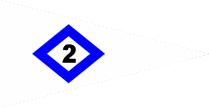
Pennant of the River Police, Croatia (fotw).
- LOZENGY
- 1) In heraldry, a term for when the field of a banner of arms or shield is covered
with lozenges or diamonds in alternating colours – fusilly (see also ‘banner of arms’,
‘fusil’,
‘lozenge 2)’ above and
‘lozengy bendy’ below).
- 2) In vexillology as above, however, the term may also be applied to a field covered with lozenges or
diamond shapes set at an angle – see ‘lozengy bendy’ below.
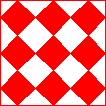

Slocum Society International (CS); Banner of Arms 18th Century, Monaco (fotw)
Please note however, that on flags this term may also be
applied to a field covered with lozenges or diamond shapes set at an angle such as those
on the flag of the German state of Bavaria, whereas in heraldic practice these would be
lozengy bendy (or bendy sinister).
- LOZENGY BENDY (or BENDY SINISTER)
- The heraldic term used when the field of a shield or banner of arms is covered with lozenges
or diamond shapes in alternating colours and set at an angle – fusilly bendy or bendy sinister–
see ‘bendy’ and ‘bendy sinister’ in ‘appendix VI’
(also ‘banner of arms’, ‘fusil’,
‘lozenge 2)’ and ‘lozengy 1)’ above).
![[a Lozengy flag]](../images/v/vxt-d200.gif)
The Arms and Flag of the State of Bavaria, Germany (fotw)
- LT COLONEL’S COLOUR (or COLOR)
- See ‘stand of colours 1)’ and ‘venn’.
![[Lieutenant Colonel’s Colours example]](../images/v/vxt-d2389a.gif)
![[Lieutenant Colonel’s Colours example]](../images/v/vxt-d2389b.gif)
![[Lieutenant Colonel’s Colours example]](../images/v/vxt-d2389c.gif)
![[Lieutenant Colonel’s Colours example]](../images/v/vxt-d2389d.gif)
![[Lieutenant Colonel’s Colours example]](../images/v/vxt-d2389e.gif)
Examples of Lt Colonel’s Colours, English c1641 (Željko Heimer, CS and fotw)
- LUNEL
- In European heraldry, the term which describes four crescent joined (or
arranged) to form a single charge (see also ‘crescent
2)’.



Examples of lunels (Wikipedia)
- LYMPHAD
- The heraldic term (more common in Scottish than in English heraldry)
for a ship with a single mast and usually (but not exclusively) oars – a birlinn, antique or ancient ship – but see the note below.
Please note that a vessel with oars but more than one mast should be
blazoned “galley”, and that in English heraldry, a single- masted, medieval
nef or cog (without oars) is often (but by no means exclusively) blazoned an
“ancient” or “antique ship” – which term can (and does) include sailing
vessels with more than one mast – see ‘cog 2)’,
‘galley’ and
‘nef’.
![[lymphad]](../images/v/vxt-d218.gif)
![[lymphad]](../images/v/vxt-d220.gif)
![[lymphad]](../images/v/vxt-d232.gif)
![[lymphad]](../images/v/vxt-d2293.gif)
Banner of Arms of New Brunswick, Canada (fotw); Banner of Arms of the
Western Isles, Scotland (fotw); Flag of
Gzira, Malta (fotw); Flag of Hauts-de-Seine, France (fotw)
![[liberty cap example]](../images/v/vxt-d1112.gif)
![[Lieutenant Colonel’s Colours example]](../images/v/vxt-d2389a.gif)
![[Lieutenant Colonel’s Colours example]](../images/v/vxt-d2389b.gif)
![[Lieutenant Colonel’s Colours example]](../images/v/vxt-d2389c.gif)
![[Lieutenant Colonel’s Colours example]](../images/v/vxt-d2389d.gif)
![[Lieutenant Colonel’s Colours example]](../images/v/vxt-d2389e.gif)
![[ligature example]](../images/v/vxt-d1239.gif)




![[litten example]](../images/v/vxt-d1265a.gif)
![[litten example]](../images/v/vxt-d1265b.gif)
![[litten example]](../images/v/vxt-d1266a.gif)
![[litten example]](../images/v/vxt-d1266b.gif)
![[Livery colour example]](../images/v/vxt-d197.gif)
![[Livery colour example]](../images/v/vxt-d197a.gif)
![[Livery colour example]](../images/v/vxt-d197b.gif)
![[Livery colour example]](../images/v/vxt-d1687a.gif)
![[Livery colour example]](../images/v/vxt-d1687b.gif)
![[Livery colour example]](../images/v/vxt-d1688a.gif)
![[Livery colour example]](../images/v/vxt-d1688b.gif)
![[logo flag]](../images/v/vxt-d586.gif)
![[logo flag]](../images/v/vxt-d1797.gif)
![[logo flag]](../images/v/vxt-d1798.gif)
![[logo flag]](../images/v/vxt-d2015.gif)
![[Nebraska]](../images/v/vxt-d1689.gif)
![[Kansas]](../images/v/vxt-d2505.gif)
![[Kentuchy]](../images/v/vxt-d2506.gif)
![[Michigan]](../images/v/vxt-d1690.gif)
![[Texas flag]](../images/v/vxt-d380.gif)
![[Civil ensign of Jerusalem]](../images/v/vxt-d1868.gif)
![[loops on a flag]](../images/v/vxt-d1009.gif)
![[loops on a flag]](../images/v/vxt-d1316.gif)
![[Lord High Admiral flag]](../images/v/vxt-d330.gif)
![[Cross of Lorraine]](../images/v/vxt-d1841.gif)
![[Cross of Lorraine]](../images/v/vxt-d1841a.gif)
![[Brazil flag]](../images/v/vxt-d912.gif)
![[lozenge]](../images/v/vxt-d1840.gif)
![[lozenge]](../images/v/vxt-d1645.gif)
![[lozenge]](../images/v/vxt-d913.gif)
![[Escutcheon example]](../images/v/vxt-d2420.gif)
![[lozenge-throughout]](../images/v/vxt-d1647.gif)
![[lozenge-throughout]](../images/v/vxt-d1648.gif)
![[lozenge-throughout]](../images/v/vxt-d1842.gif)



![[Lieutenant Colonel’s Colours example]](../images/v/vxt-d2389a.gif)
![[Lieutenant Colonel’s Colours example]](../images/v/vxt-d2389b.gif)
![[Lieutenant Colonel’s Colours example]](../images/v/vxt-d2389c.gif)
![[Lieutenant Colonel’s Colours example]](../images/v/vxt-d2389d.gif)
![[Lieutenant Colonel’s Colours example]](../images/v/vxt-d2389e.gif)
![[lymphad]](../images/v/vxt-d218.gif)
![[lymphad]](../images/v/vxt-d220.gif)
![[lymphad]](../images/v/vxt-d232.gif)
![[lymphad]](../images/v/vxt-d2293.gif)

![[livery banner example]](../images/v/vxt-d1113.gif)

![[Fourth canton]](../images/v/vxt-d1576d.gif)
![[Third canton]](../images/v/vxt-d1576c.gif)
![[lowered]](../images/v/vxt-d1267.gif)
![[lowered]](../images/v/vxt-d2254.gif)
![[a Lozengy flag]](../images/v/vxt-d200.gif)


